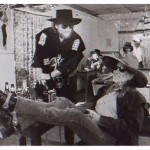Consider these scenarios:
You get an email from a friend with a news clip about a Texan who fought back against his freedom-hating Muslim neighbors by holding pig races on his farm; you assume the report was an accurate account of the situation and forward the email to other friends.
You read a headline from Robert Spencer saying that an honor killing over Christmas was ignored by the Mainstream Media; this confirms what you believe about Muslims, so you ignore the fact that the murder followed the standard murder-suicide narrative.
A friend shares a picture of the Real Trayvon Martin on Facebook, and, just as you suspected, he was a thug. Or, better yet, on a Christian website you find an article about him that includes pictures of Martin as a thug; you don’t bother to read the article, but you do link to it on your website as evidence of Martin‘s thugishness.
How could Christians fall for these stories and have such errors in judgement? To quote Paul Simon, one answer is that “a man hears what he wants to hear and disregards the rest,” otherwise known as Myside or Confirmation Bias, which is actually only one of many Cognitive Biases which make us draw faulty conclusions about reality.
Most of us are aware that we have biases, but we believe that we can avoid the effects of our biases by some combination of self-awareness, open-mindedness, education, and intelligence. Let’s face it, the chumps who fell for the scenarios I listed above were probably uneducated, white, conservative, Christians who just believe whatever fits their agenda. If they were educated and open-minded about other beliefs, they wouldn’t be so blind to their own biases, we think to ourselves.
Except that a study published in Journal of Personality and Social Psychology has shown that cognitive ability and thinking disposition do not decrease our biases, and may in fact increase our susceptibility to biases. Past studies have also shown that education doesn’t seem to solve the problem either. Despite our intelligence, our open-mindedness, our self-awareness, and our education, humans are prone to Cognitive Biases. We think we have a problem or situation figured out, when in reality a basic error in thinking has blinded us to reality.
Why is it that intelligence might actually increase our biases?
One provocative hypothesis is that the bias blind spot arises because of a mismatch between how we evaluate others and how we evaluate ourselves. When considering the irrational choices of a stranger, for instance, we are forced to rely on behavioral information; we see their biases from the outside, which allows us to glimpse their systematic thinking errors. However, when assessing our own bad choices, we tend to engage in elaborate introspection. We scrutinize our motivations and search for relevant reasons; we lament our mistakes to therapists and ruminate on the beliefs that led us astray.
The problem with this introspective approach is that the driving forces behind biases—the root causes of our irrationality—are largely unconscious, which means they remain invisible to self-analysis and impermeable to intelligence. In fact, introspection can actually compound the error, blinding us to those primal processes responsible for many of our everyday failings. We spin eloquent stories, but these stories miss the point. The more we attempt to know ourselves, the less we actually understand. (The New Yorker)
What this all means is that we all have biases, and our efforts to rid ourselves of them through education and self-awareness don’t actually “fix” the problem. This past week we saw an example of this when a Daily Currant article reported that Sarah Palin said some incredibly stupid things on Fox & Friends about Easter:
Jesus would gather all the townspeople around and would listen to their stories about the meaning of Easter in their lives. Then he would teach them how to love one another, how to protest Roman abortion clinics and how to properly convert homosexuals.
Hopefully, by the time Palin brings up “Roman abortion clinics” you’ve realized this must be satire. But lots of people didn’t believe it was satire. In fact, Piers Morgan reported on the story as if it were real. Jeremy Lott of Real Clear Religion has a good write-up of how people fell for this satire. I saw otherwise intelligent and extremely well-educated liberals share this story as if it were an actual news report. What would bring these people to believe such an obviously ridiculous story?
Confirmation bias. It’s indiscriminate. No matter your politics or education you are subject to this phenomenon. So strong is this force that it’s not uncommon to see people dismiss the truth as irrelevant when faced with their error.
“Even if Palin didn’t actually go on Fox & Friends and make stupid remarks about Jesus and Easter, she’s dumb enough to, so the criticism of her is justified,” they might say.
Or, “So what if this isn’t actually a picture of a Muslim mass wedding of pre-pubescent girls, Muslims do this all the time, so they are still animals.”
We are so committed to our vision of the world that when we are shown to be wrong, our response is often anything but acceptance.
And our bias-blindness has serious consequences.
Our biases can cause us to dishonor Christ (by sharing a deceptive picture of “Trayvon Martin,” for example), hurt our neighbor (by portraying Muslims as violent and devoted to destroying America, for example), weaken our witness (by showing ourselves to be fools), support bad public policies, and so on.
But, if we can’t just be more open-minded, or more educated, or more intelligent, what can we do to avoid making decisions affected by our biases?
We cannot analyze ourselves to pure objectivity; we will always be blind to some bias in our thinking. But we are good at observing and pointing out the biases in others. Which means that we need to rely upon each other for correction. Our task is to cultivate communities where criticism, disagreements, and differences exist with love and grace (2 Tim. 4:2). It’s not acceptable to allow one another to continue on in blindness and ignorance. We must sharpen each other, lovingly, but actively (Prov. 27:17). And for more on why criticism is critical for believers, see Why I Criticize the Church.
Such a community requires us to be open to correction, with the knowledge that we not only have biases, but that we are likely blind to many of them. Our response to loving criticism or disagreement shouldn’t be shock, hurt, anger, dismissiveness, or defensiveness, but gratitude and prayerful reflection. Let’s petition the Lord for wise correction, knowing that He will provide it and that the prayer will form our hearts to be open to contrary views.
But even as we correct one another, we must be deeply humble, knowing that we too are flawed. We make cognitive errors. We allow our deeply rooted prejudices to negatively affect our thinking. We foolishly pride ourselves on being Objective and Open to Contrary Evidence, when we really aren’t. So as we sharpen one another, we must do so in a spirit of humility and love. A practical way to do this is to “hope all things” about our neighbors and their beliefs, rather than assume that we objectively understand their position and motives (1 Cor. 13:7).
If we only receive criticism within our community, however, we will still allow our shared biases to hurt us, which is why it is so valuable to listen to those outside our circles. We may have profoundly different presuppositions about God and politics, but often it is the opposition who can see more clearly our own flaws. Let’s become comfortable accepting correction from our antagonists, knowing that acknowledging an error does not mean we are conceding our entire position. Sometimes we are so afraid that the Other Team will think they scored a point that we refuse to admit when they are right about anything.
As Christians, the results of this study shouldn’t be a surprise to us, and neither should the importance of loving correction. We know that “the heart is deceitful above all things” and that only God can see us truly (Jer. 17:9–10); we habitually ignore the planks in our own eyes even while we criticize others (Matt. 7:5); and we know that we are called to “stir one another up to love and good works” (Heb. 10:24), not allow each other to dwell in ignorance. Communities that embrace self-criticism and external criticism will not come close to eliminating the errors caused by confirmation bias, but they are a start. So, let us enter public discourse humbly and graciously, aware that we need one another to see the world rightly.
This post was adapted from an older article.












